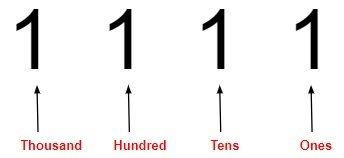将给定的数字转换成单词的 C 语言程序
给定一个由数值组成的字符串,任务是将给定的数字转换成单词。
例如,我们有一个输入“361”,那么输出应该用单词表示,即“Three hundred sixty one”。要解决以下问题,我们必须记住数字和数字所在的位置,例如个位、十位、千位等。
该代码仅支持最多 4 位数字,即 0 到 9999。因此,输入应该在 0 到 9999 之间。
让我们考虑 1,111,所以位置将如下所示:

示例
Input: “1234” Output: one thousand two hundred thirty four Input: “7777” Output: seven thousand seven hundred seventy seven
我们用来解决给定问题的思路 −
- 将输入作为字符串。
- 为不同的值创建数组。
- 检查输入长度,根据长度,我们将决定将显示输出到哪些位置。
- 根据位置显示输出。
算法
Start Step 1 → In function convert(char *num) Declare and initialize int len = strlen(num) If len == 0 then, fprintf(stderr, "empty string
") Return End If If len > 4 then, fprintf(stderr, "Length more than 4 is not supported
") Return End If Declare and initialize a char *single_digit[] = { "zero", "one", "two","three", "four","five","six", "seven", "eight", "nine"} Declare and initialize a char *tens_place[] = {"", "ten", "eleven", "twelve","thirteen", "fourteen","fifteen", "sixteen","seventeen", "eighteen", "nineteen"} Declare and Initialize a char *tens_multiple[] = {"", "", "twenty", "thirty", "forty", "fifty","sixty", "seventy", "eighty", "ninety"} Declare and initialize char *tens_power[] = {"hundred", "thousand"} Print num If len == 1 then, Print single_digit[*num - '0'] Return End If While *num != '\0 If len >= 3 If *num -'0' != 0 Print single_digit[*num - '0'] Print tens_power[len-3] End If Decrement len by 1 End If Else If *num == '1' then, Set sum = *num - '0' + *(num + 1)- '0' Print tens_place[sum] Return End If Else If *num == '2' && *(num + 1) == '0' then, Print “twenty” Return End else If Else Set i = *num - '0' Print i? tens_multiple[i]: "" Increment num by 1 If *num != '0' then, Print single_digit[*num - '0'] End If End Else Increment num by 1 End Else End while Step 2 → In function main() Call function convert("9132") Stop
示例
#include <stdio.h>
#include <string.h>
#include <stdlib.h>
//function to print the given number in words
void convert(char *num) {
int len = strlen(num);
// cases
if (len == 0) {
fprintf(stderr, "empty string
");
return;
}
if (len > 4) {
fprintf(stderr, "Length more than 4 is not supported
");
return;
}
// the first string wont be used.
char *single_digit[] = { "zero", "one", "two", "three", "four","five", "six", "seven", "eight", "nine"};
// The first string is not used, it is to make
// array indexing simple
char *tens_place[] = {"", "ten", "eleven", "twelve", "thirteen", "fourteen", "fifteen", "sixteen", "seventeen", "eighteen", "nineteen"};
// The first two string are not used, they are to make
// array indexing simple
char *tens_multiple[] = {"", "", "twenty", "thirty", "forty", "fifty","sixty", "seventy", "eighty", "ninety"};
char *tens_power[] = {"hundred", "thousand"};
// Used for debugging purpose only
printf("
%s: ", num);
// For single digit number
if (len == 1) {
printf("%s
", single_digit[*num - '0']);
return;
}
// Iterate while num is not '\0'
while (*num != '\0') {
// Code path for first 2 digits
if (len >= 3) {
if (*num -'0' != 0) {
printf("%s ", single_digit[*num - '0']);
printf("%s ", tens_power[len-3]); // here len can be 3 or 4
}
--len;
}
// Code path for last 2 digits
else {
// Need to explicitly handle 10-19. Sum of the two digits is
//used as index of "tens_place" array of strings
if (*num == '1') {
int sum = *num - '0' + *(num + 1)- '0';
printf("%s
", tens_place[sum]);
return;
}
// Need to explicitely handle 20
else if (*num == '2' && *(num + 1) == '0') {
printf("twenty
");
return;
}
// Rest of the two digit numbers i.e., 21 to 99
else {
int i = *num - '0';
printf("%s ", i? tens_multiple[i]: "");
++num;
if (*num != '0')
printf("%s ", single_digit[*num - '0']);
}
}
++num;
}
}
int main() {
convert("9132");
return 0;
}输出
nine thousand one hundred thirty two

广告

 数据结构
数据结构 网络
网络 RDBMS
RDBMS 操作系统
操作系统 Java
Java iOS
iOS HTML
HTML CSS
CSS Android
Android Python
Python C 语言程序
C 语言程序 C++
C++ C#
C# MongoDB
MongoDB MySQL
MySQL Javascript
Javascript PHP
PHP